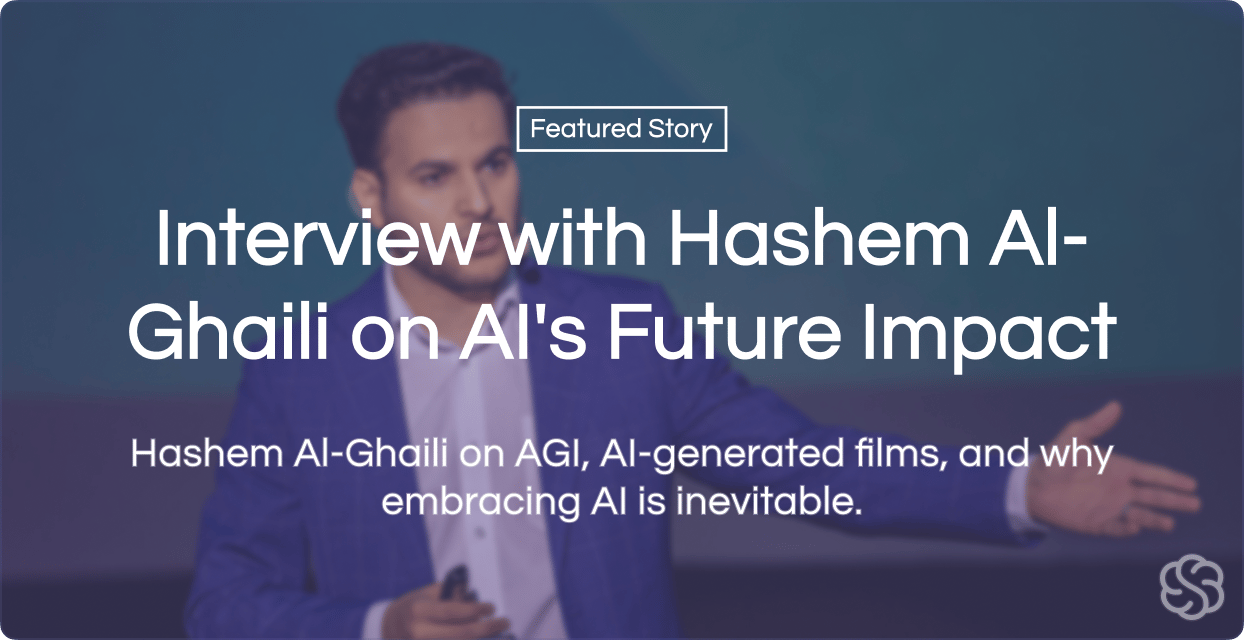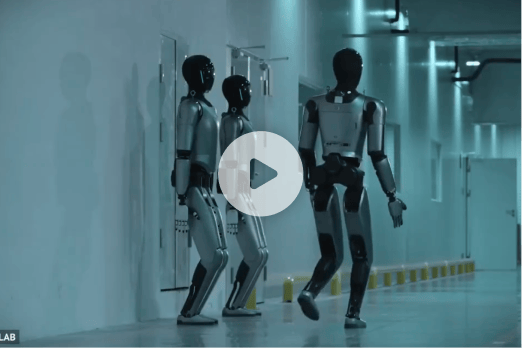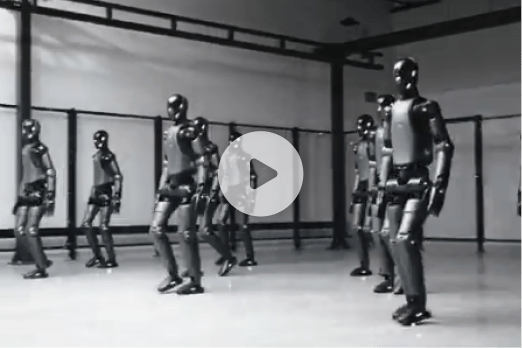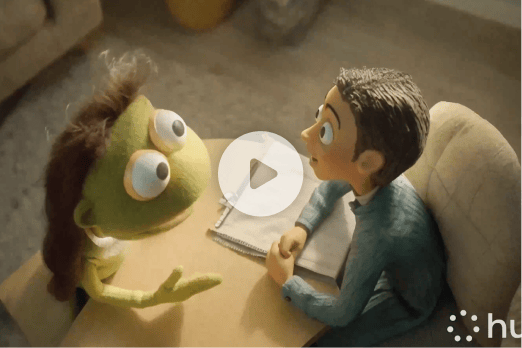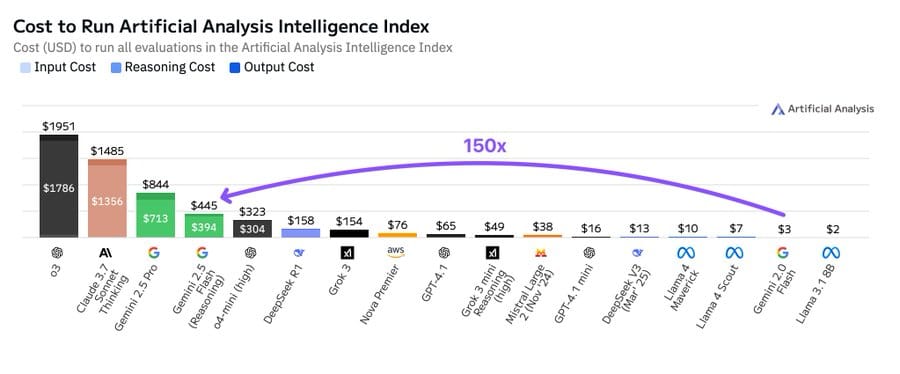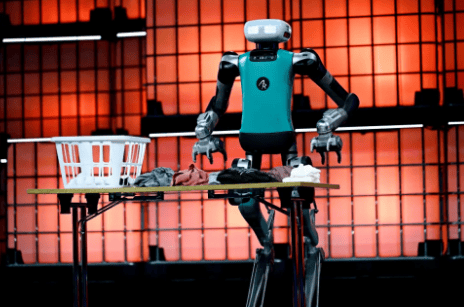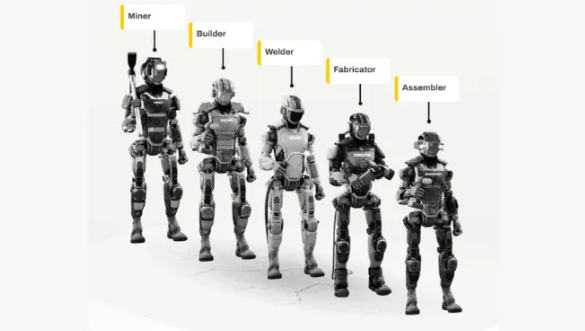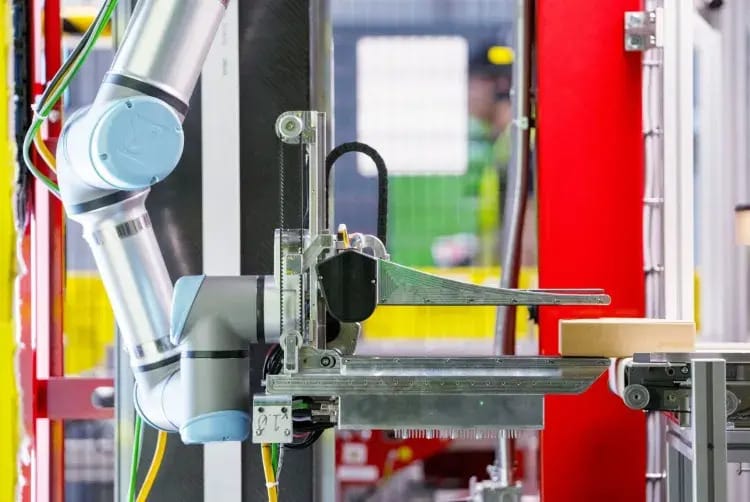Dear Readers,
Today is Tuesday, which means it's time to focus on robotics again. As always, there are weekly improvements to report.
In addition, we are also publishing the second part of our interview with Hashem Al-Ghaili
In Today’s Issue:
AGI in the 2020s? Hashem Al-Ghaili Thinks So
Humanoid robots are now on real factory floors, doing precision work.
A new AI controller makes robots move more like humans.
Hume’s voice AI is more emotionally stable!
And more AI goodness…
All the best,

Interview with Hashem Al-Ghaili on AI's Future Impact
The TLDR
AGI is closer than most expect, with predictions placing it within this decade. Hashem Al-Ghaili discusses how it will transform jobs, creativity, and society—while calling for preparation through UBI, ethical safeguards, and a mindset shift toward collaboration with AI.
Kim Isenberg: There's a common stance that AGI will arrive in the near future. Hasabis says in 5 to 10 years, Dario Amodei suspects superintelligence between 2026 and 2027, and Sam Altman says it's just a few thousand days away. What impact will it have? How will our lives change when AGI arrives?
Hashem Al-Ghaili: We're all going to have to look for new jobs. It's going to be transformative, moving us toward a higher purpose. Repetitive jobs and tasks will become obsolete, and new jobs and markets will emerge. It will revolutionize science, technology, and economics.
It will also bring unethical applications. We've already seen this with current AI—scamming, blackmail, deepfakes. It will be hard to distinguish between what's real and what's not. We need to prepare for both negative and positive applications.
Kim Isenberg: Do you think we need something like UBI when AGI hits our societies?
Hashem Al-Ghaili: We would need universal basic income, especially for people whose work has been used to train AI models. If you're an artist who suddenly finds yourself out of a job because your work trained an AI model, you should be entitled to compensation. But how do you determine how much? And will it make people lazier?
We've seen this in Germany's unemployment system. Some become lazy and stop searching for work, while others change their lives positively. It's hard to predict, but I think AGI will happen in less than 20 years.
Kim Isenberg: What jobs will even survive? We need to discuss these topics more because 20 years is nothing. And 2026-2027 is literally just one to two years away.
Hashem Al-Ghaili: The father of AI initially estimated 20 years for AI to take over, then shortened it to 10. He's seeing it advance faster than expected, and we all see that too.
Kim Isenberg: Everyone underestimates exponential development.
Hashem Al-Ghaili: Ray Kurzweil's estimate of 2045 isn't accurate anymore. It's definitely happening in the 2020s, probably late 2020s. We're almost there—it's happening in our lifetime.
Kim Isenberg: Looking at your content, you created a completely AI-generated movie in 2023, "The Last Stand." Two years in AI time is an eternity. What were your experiences then, and how has it changed?
Hashem Al-Ghaili: I made it when these tools were just booming. While I used a lot of AI, it wasn't fully AI-generated. There was still significant manual labor. The script and storyboards were AI-assisted, but music was by a human composer, and many shots needed to be manually created.
Now you can have a film generated entirely with AI tools—from brainstorming to image generation, video, and sound effects. You can tell AI to generate sound effects based on a video, and it studies the footage and generates audio in less than a minute.
The only human input needed is creativity, prompting, and direction—which is still substantial work. I hate when people see AI-assisted content and say, "It's just AI. You didn't create anything." Who was sending commands to the AI tools? A human.
Kim Isenberg: If you redid the movie today, it would be much easier, right? Do you plan to make more AI videos?
Hashem Al-Ghaili: The quality would be much higher. AI-assisted movies are my new thing now, and I can't wait for my upcoming 10-minute film to come out.
Kim Isenberg: The quality is shockingly good. It looks so human.
Hashem Al-Ghaili: It will only keep getting better, cheaper, and require less human optimization.
Kim Isenberg: Do you think there will be AI agents creating movies in the future?
Hashem Al-Ghaili: Absolutely. But will they be watchable? Content where humans remain involved will likely be more engaging. But streaming services will generate movies based on your own likeness and preferences.
Kim Isenberg: Like a Black Mirror episode—custom content 24/7.
Hashem Al-Ghaili: Exactly. I'd like AI to be involved in every sector.
Kim Isenberg: What developments are you most looking forward to?
Hashem Al-Ghaili: Its integration in science and technology, making discoveries faster and more efficient. Especially in medicine—detecting diseases earlier so treatments can begin sooner. Also, content creation where you could upload a book and instantly have it turned into a movie.
Kim Isenberg: What projects are you working on now?
Hashem Al-Ghaili: I have many scripts waiting to be made into content. While I'm working alone now, I hope to eventually have a production studio with people trained in AI to increase output.
Kim Isenberg: Where can people follow your work?
Hashem Al-Ghaili: Instagram is where I post most frequently—science news and various content. On YouTube, I post only the videos I'm completely satisfied with. I'm also on LinkedIn, TikTok, and Snapchat.
Kim Isenberg: How has your content evolved over time?
Hashem Al-Ghaili: It's become more professional and higher quality.
Kim Isenberg: The quality is insane. How can such a small team create such high-quality video?
Hashem Al-Ghaili: It's just me and a video editor. I create two types of content: daily videos with the editor, and higher-quality content every week or two that I work on myself. AI has shrunk the team.
Hashem Al-Ghaili: My advice to everybody is: embrace AI. Make it an integral part of your life. To those resisting AI-generated content: you will get used to it eventually. People resisted digital photography and smartphones, but they became standard. Many obsolete jobs are gone, and new ones have emerged.
Remember, AI isn't something brand new—it's a collection of everything humanity has been doing, just repackaged. We should enjoy its benefits.
Kim Isenberg: Fantastic. It was a pleasure meeting you. Everyone should follow your work.
Hashem Al-Ghaili: Thank you.
Kim Isenberg: Bye.
Hashem Al-Ghaili: Take care.
Ad
Start learning AI in 2025
Keeping up with AI is hard – we get it!
That’s why over 1M professionals read Superhuman AI to stay ahead.
Get daily AI news, tools, and tutorials
Learn new AI skills you can use at work in 3 mins a day
Become 10X more productive
In The News
MagicBot Joins the Factory Floor
MagicBot, the humanoid robot developed by MagicLab, is now being deployed in real industrial settings. It performs critical tasks like product inspection, material handling, precision assembly, barcode scanning, and inventory management. This marks a major step in integrating advanced robotics into everyday manufacturing workflows.
Robots Walk Like Never Before
10x has unveiled humanoid robots powered by a new AI walking controller trained entirely in simulation. This breakthrough allows for smoother, more natural movement, marking a leap forward in robotics agility and real-world readiness.
Hume’s Octave TTS Shows More Emotional Intelligence
Hume’s Octave TTS impresses with its emotionally nuanced speech synthesis, responding with empathy and tone that feels surprisingly human. Compared to a recent viral clip of an erratic therapist, Octave comes off as the more emotionally grounded of the two.
Graph of the Day
Google’s Gemini 2.5 Flash costs 150x more than Gemini 2.0 Flash to run Artificial Analysis Intelligence Index

2025: The year of humanoid factory workers
Boston Dynamics will bring the fully electric Atlas to a Hyundai factory in 2025 – the first commercial use of a versatile humanoid. AI-supported learning processes make Atlas strong, persistent, and flexible enough to take on changing assembly tasks, replacing traditional specialized lines. Experts see the beginning of a billion-dollar market for “robotic workers” and significantly shorter automation cycles.
Humanoid welding robots are revolutionizing shipbuilding
On May 9, startup Persona AI agreed with HD Hyundai and Korea's largest shipbuilder on a pilot program for humanoid robots that autonomously perform high-risk welding tasks. Robust hardware meets welding data AI to increase productivity, enhance safety, and alleviate the shortage of skilled workers in shipyards. If the live deployment is successful, it could open up a huge maritime market for heavy-duty cobots.
Amazon's Vulcan senses what it touches
This week, Amazon unveiled Vulcan, a warehouse robot with tactile sensors and AI control. It already processes 75% of the product range, has picked over 500,000 orders from Spokane to Hamburg, and is continuously learning from force and touch feedback. Vulcan relieves employees of unergonomic tasks and paves the way for safe, versatile human-robot teams in logistics.
Question of the Day
Quote of the Day


